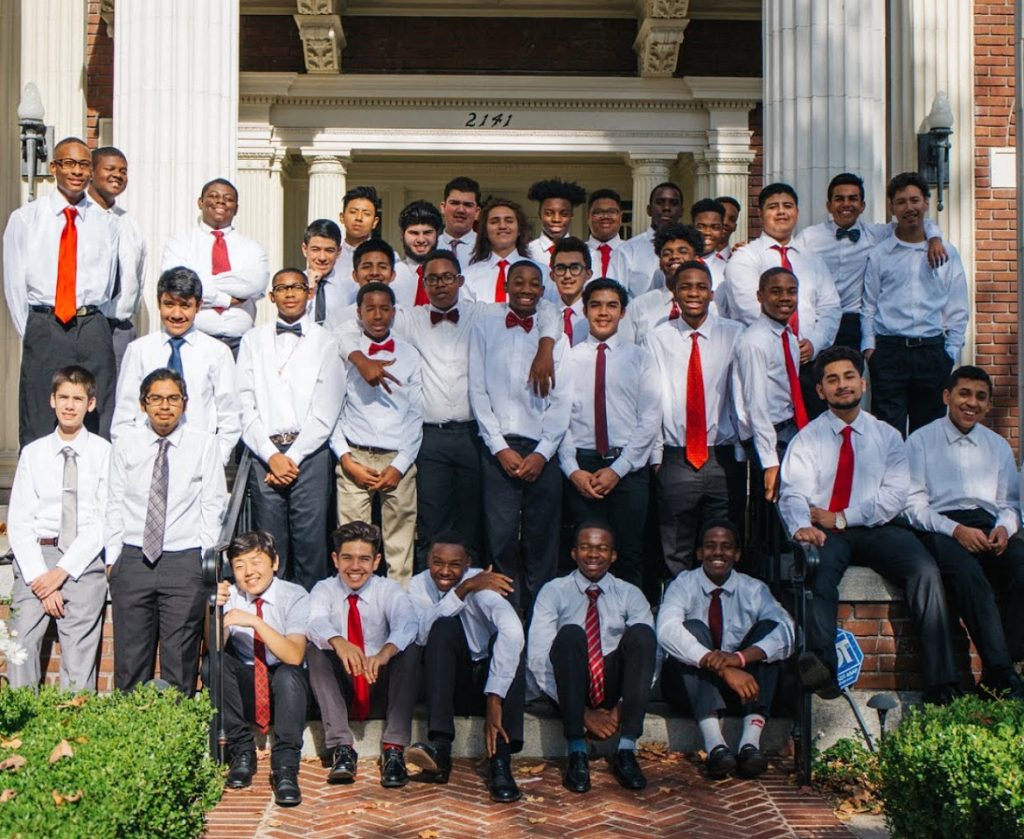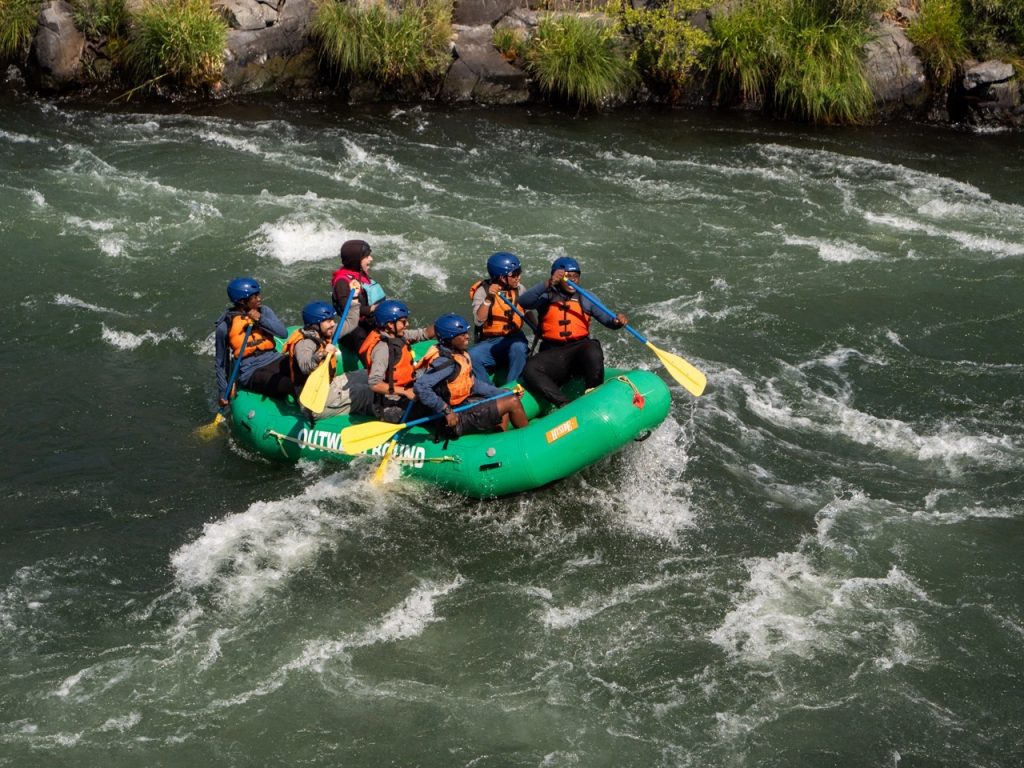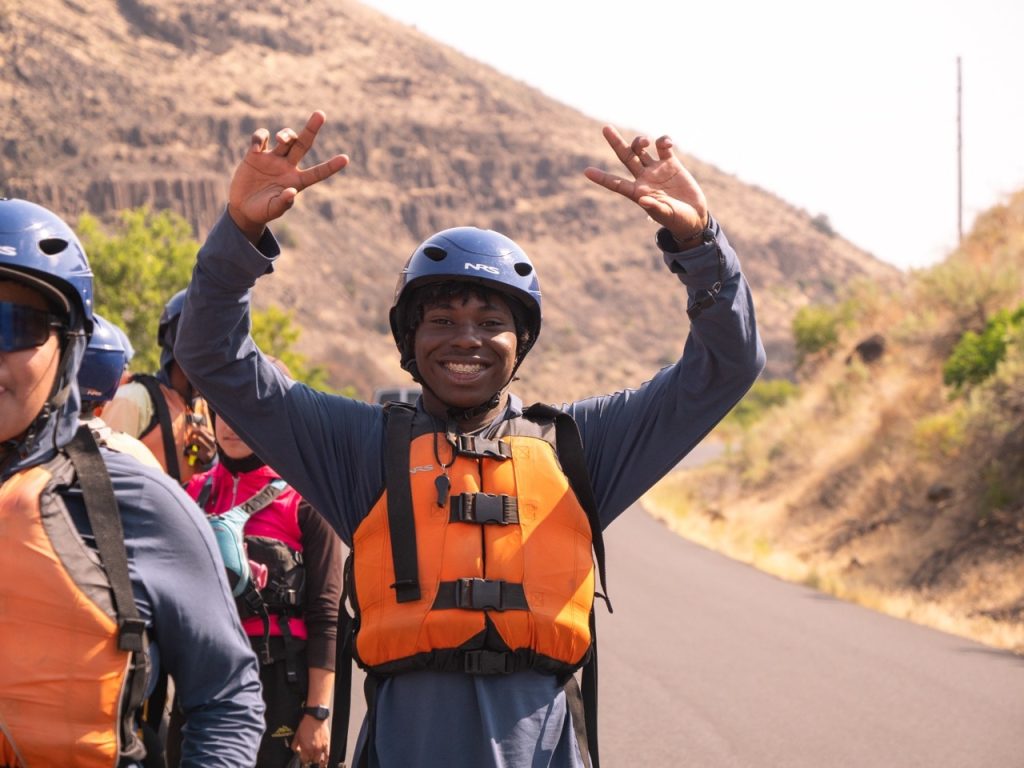Back in 2017, Alexes Gonzalez was a high school student from East LA with college on his mind and no idea what he was getting into. One day, he found himself deep in the mountains, carrying a 50-pound backpack, no phone, and surrounded by total strangers. It was part of The Fellowship Initiative (TFI), a powerful JPMorganChase program supporting young men of color on their journey to college and career success.
As his first step into TFI, Alexes had to complete a multi-day Outward Bound expedition. It sounded simple enough, but those days in the wild pushed him far beyond his comfort zone and set him on a path of transformation.
Fast forward to 2024: Alexes is back in the wilderness—but this time as a chaperone, guiding and mentoring the next generation of TFI Fellows. What did he learn on both ends? You grow the most when you put yourself into something new. Something challenging.
“Some of the most impactful lessons I’ve learned are simple: help your fellow man, step out of your comfort zone to grow, and always look for the lesson in the hardship. Keep your mindset positive; it makes all the difference.”
Where Brotherhood Began
The first few days of the expedition were rough. Most students, including Alexes, were completely out of their element. No phones, no beds, no familiar faces; just sore muscles, heavy packs, and long days on the trail.
“It was hard. We were tired, frustrated, and honestly just trying to get through it,” Alexes remembers.
But something shifted. Somewhere between the blisters and team challenges, the group started to connect. They weren’t classmates anymore, they became family. They were crew.
“We went from strangers to siblings,” Alexes says. “We were all in it together, and that brought us closer than I ever expected.”
That 2017 expedition wasn’t just a story, it was a turning point. For Alexes, it sparked a mindset rooted in leadership, trust, and showing up for others.

TFI, Outward Bound USA Crew (2017) | Photo provided by: Alexes G.
He walked away with takeaways that still guide him:
- Brotherhood is built through shared hardship.
- You’re only as strong as your weakest link.
- Discomfort is a doorway to growth.
That trip gave us real camaraderie,” Alexes said. “It made everything we did afterward more meaningful because we had already been through something real, something hard, together.
Even years later, his cohort still looks back on that experience as defining.
“After the trip, that’s all we talk about. Even now, when I run into some of the TFI fellows, I’m like, ‘Hey man, remember the trip?’ Then we talk for hours. Like, ‘Remember when someone fell? Or got sick?’ [Laughs] That bond from going through something hard together really solidified us a brotherhood. We’d been through it, so now we could see eye to eye.”
Back to the Mountains, This Time as “Unc”
In 2024, Alexes, now a computer science student at Chico State, returned to the mountains, but not as the teen with the heavy backpack. He was the chaperone, guiding a new group of TFI Fellows through the same Outward Bound experience that changed his life.
He missed a later trip during his own time in the program, so coming back felt like a second chance, not just to reconnect with nature but to pay it forward.
“What really pushed me to come back was wanting to see how the new cohort was doing,” he reflected. “It felt like coming back home from college.”
Even with his own doubts—“Are they gonna listen to me? Will they take me seriously, or just see me as another adult telling them what to do?”—Alexes chose a different approach. Instead of an authority figure, he leaned into “big brother energy.”
“Some of my best memories came after they realized, ‘Okay, this dude’s for real, we can’t walk all over him.’ That’s when I started getting their respect and I felt the shift. There was one moment where I told them straight up: ‘You’re not just representing yourself; you’re representing your parents, TFI, everyone who got you here,” he shared. “I told them, ‘I’ve been exactly where you are. Every emotion you’re feeling? I felt it, too. But if you shift your mindset and start respecting each other, everything changes. Respect goes a long way.’”
That moment changed everything. As the days went on, students opened up, turning to Alexes for advice, support, and perspective. His vibe was approachable, honest, and grounded. Eventually, they gave him a nickname: “Unc.” A sign of trust and respect, and a sign he’d become part of their story.
“In this generation, if you’re even a little older, they instantly call you ‘Unc.’ I’m like, ‘I’m in my 20s, man!,’ he laughed. “They’d come up asking, ‘Unc, how do you handle this?’ or ‘Unc, I’m stressed,’ and I’d share some older brother advice. Honestly, it was pretty cool being the go-to guy.”
Alexes was helping shape their experience, just like others had done for him years earlier. He helped them make sense of struggle, reflect on growth, and see their potential.
Leading by Example
One of the biggest lessons Alexes took away as a chaperone? Real leaders go first.
Whether cliff-jumping or navigating deep conversations, he chose to lead by example, not to impress, but to inspire.
“When students were scared or unsure, I’d tell them, ‘Do it scared,’” he shared. “Then I’d be the first one in the water.”

Deschutes River Rafting | NWOBS, TFI and Outward Bound USA, Photo By: Ada Cohen (2024)
This built serious trust. By showing his own fear and pushing through it, Alexes made it okay for students to face theirs. He wasn’t just guiding. They were in it together.
That vulnerability created connection, and that connection created space for real growth.
But it wasn’t just about the hike or physical challenges. Alexes used the trip to talk about what comes next: college, career, and life after high school. The students listened because he’d been where they were and was now on the other side, making moves.
“Since I was in college at the time, I was able to talk to the students about what I’d been doing and why going to college or higher education matters,” Alexes reflected. “It’s kind of crazy to say out loud, but everything’s connected. From my first Outward Bound trip to coming back as a chaperone, the lessons from TFI still hit home. I was helping them learn what I once learned, and it was awesome seeing how every student grew in their own way.”
Unplugging to Reconnect: The Power of a Phone Detox
One of the biggest challenges for the 2024 cohort wasn’t the physical strain—it was the phone detox.
“They were going through real withdrawal,” Alexes laughed. “They couldn’t stop talking about what they were missing online.”
But as the days passed and screens stayed tucked away, something changed. Without constant social media distraction, students engaged more deeply with nature, each other, and themselves.
By the end, some didn’t even want their phones back. One remarked, “This device feels so foreign now, I don’t even know why I want it.”
It was a powerful reminder that Alexes relayed: Sometimes you need to step away and look within.

Deschutes River Rafting | NWOBS, TFI and Outward Bound USA, Photo By: Ada Cohen (2024)
From Student to Chaperone: The Full-Circle Moment
Perhaps the most powerful moment came at the 2024 trip’s end. Several students approached Alexes saying, “I want to be a chaperone one day.”
It was the same thought he’d had years before. That full-circle moment captured the program’s purpose: transformation that ripples forward.
“These teens showed up unsure, even resistant. But by the end, they were laughing, lifting each other up. That’s what this is about,” Alexes shared. “Sometimes you just need to step away from everything and be in nature to face what you’ve been avoiding and gain new perspective. These trips are like a crash course in life—getting out of your comfort zone, meeting new people, being open to new experiences.”
And those lessons don’t stay in the wilderness. They follow students back to classrooms, job interviews, tough family moments, and whatever futures they build.
Like, when you’re stressing over a math test, you think, ‘Hey, I survived a whole week outside, I can do this.’ Those are good life lessons. I know these experiences will stick with them for a lifetime.
Alexes Gonzalez’s journey shows what happens when young people are given the space—and challenge—to rise. Maybe it all starts with a backpack, a trail, and no phone signal.
“My cohort still talks about it, and I’m sure the next groups will, too. Those memories stick. What really makes programs like this work is that hardship builds brotherhood, camaraderie, and team spirit. You’re all doing something nobody wants to do, but you’re helping each other through it, and that’s a powerful lesson. That’s why I think TFI and Outward Bound is a great partnership. You can tell someone the right thing to do all you want, but you can’t make them live it. These trips help students figure it out on their own, like I did.”




